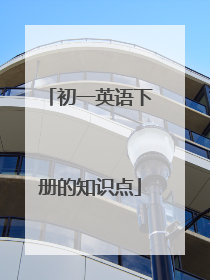初一下册英语重点知识点归纳
初一下册英语重点知识点归纳 篇1 一、look for/ find look for 意为"寻找",而find意为"找到,发现",前者强调"找"这一动作,并不注重"找"的结果,而后者则强调"找"的结果。例如: She can't find her ruler. 她找不到她的尺子啦。 Tom is looking for his watch,but he can't find it.汤姆正在寻找他的手表,但没能找到。 二、 be sleeping/ be asleep be sleeping 表示动作,意思是"正在睡觉";be asleep 表示状态,意思是"睡着了"。如: ---What are the children doing in the room? 孩子们在房间里做什么? ---They are sleeping.他们正在睡觉。 The children are asleep now.现在孩子们睡着了。 三、 often/ usually/sometimes often表示"经常",sometimes表示"有时候",在表示发生频率上often要高于usually,usually要高于sometimes。这三个词表示的是经常性,一般性的动作或情况,常与一般现在时连用,常位于主要谓语动词的前面,其他谓语动词(be动词,情态动词和助动词)的后面,有时也可位于句尾。如果要加强语气,则放在句首。 We usually play basketball after school.我们通常放学后打篮球。 Sometimes I go to bed early.有时,我睡觉很早。 He often reads English in the morning.他经常在早晨读英语。 四、How much/ How many how much常用来询问某一商品的价格,常见句式是How much is / are…? How much is the skirt? 这条裙子多少钱? How much are the bananas? 这些香蕉多少钱? how much后加不可数名词,表示数量,意为"多少",how many后加可数名词的复数形式。 How much meat do you want? 你要多少肉呀? How many students are there in your class? 你们班有多少人? 初一下册英语基础知识 短语归纳 1. would like 想要 2. take one’s order 点菜 3. beef soup 牛肉汤 4. one bowl of… 一碗…… 5. what size 什么尺寸 6. mapo tofu with rice 麻婆豆腐盖饭 7. what kind 什么种类 8. small / medium / large bowl 小/ 中/大碗 9. green tea 绿茶 10. orange juice 橘汁 11. around the world 世界各地 12. birthday cake 生日蛋糕 13. the number of… ......的数量 14. make a wish 许个愿望 15. blow out 吹灭 16. in one go 一口气 17. come true 实现 18. cut up 切碎 用法集萃 1. would like + sth. 想要某物 2. would like + to do sth. 想要做某事 3. Why don’t you + do sth.? 何不做某事? 4. the number of + 名词复数 ……的数量;a number of+名词复数 许多…… 典句必背 1. What kind of noodles would you like? 你想要哪种面条? 2. I’d like beef noodles, please. 我想要牛肉面。 3. What size would you like? 你想要多大的? 4. I’d like a medium bowl, please. 我想要一个中碗的。 5. Would you like a large bowl? 你想要一个大碗的吗? 6. Yes, please. 好吧。 7. If he or she blows out all the candles in one go, the wish will come true. 假如他或她一口气吹灭所有的蜡烛,愿望将实现。 初一英语语法知识 动词 A) 第三人称单数 当动词是第三人称单数时,动词应该像名词的单数变动词那样加s,如下: 一)一般在词后加s。如:comes, spells, waits, talks, sees, dances, trains 二)在x, sh, ch, s, tch后加es。如:watches, washes, wishes, finishes 三)1)以辅音字母加y结尾的变y为i再加es。如:study-studies, hurry-hurries, try-tries 2)以元音字母加y结尾的直接加s。如:plays, says, stays, enjoys, buys 四)以o结尾加es。如:does, goes 五)特殊的有:are-is, have-has B) 现在分词 当我们说某人正在做什么事时,动词要使用分词形式,不能用原形,构成如下: 一)一般在后加ing。如:spell-spelling, sing-singing, see-seeing, train-training, play-playing, hurry-hurrying, watch-watching, go-going, do-doing 二)以不发音e的结尾的去掉e再加ing。如:dance-dancing, wake-waking, take-taking, practice-practicing, write-writing, have-having 三)以重读闭音节结尾且一个元音字母+一个辅音字母(注意除开字母组合如show –showing, draw-drawing)要双写最后的辅音字母再加ing。如:put-putting, run-running, get-getting, let-letting, begin-beginning 四)以ie结尾的变ie为y再加ing。如:tie-tying系 die-dying死 lie-lying 位于 初一下册英语重点知识点归纳 篇2 1. this/that/these/those (1)this常常用来指在时间、地点上更接近讲话人的人和事,these是this的复数形式。that常常用来指在时间、地点上离讲话人更远一点的人和事,those时that的复数形式。例如:You look in this box and I’ll look in that one over there.你看看这个盒子,我去看那边的那个盒子。 I want this car, not that car.我想要这辆小汽车,不是那一辆。 Take these books to his room, please.请把这些书拿到他房间去。 This is mine; that’s yours.这个是我的,那个是你的。 These are apples; those are oranges.这些是苹果,那些是橘子。 (2)在打电话的用语中,this常常指的.是我,that常常指的是对方。例如: This is Mary speaking. Who’s that?我是玛丽。你是谁? 2. in/on 在表示空间位置时,in表示在某个空间的范围以内,on表示在某一个物体的表面之上。 例如:There is a bird in the tree.树上有只鸟。There is a picture on the wall.墙上有张图。 3. Therebe/ have There be "有",其确切含意为"某处或某时存在某人或某物。"其结构是:There be +某人或某物+表示地点或时间的状语。There be后面的名词实际上是主语,be动词的形式要和主语在数上保持一致,be动词后面的名词是单数或不可数名词时用is,名词是复数时用are。例如: (1) There is a big bottle of coke on the table.桌上有一大瓶子可乐。 (2) There is a doll in the box.那个盒子里有个娃娃。 (3) There are many apples on the tree.那树上有许多苹果。 总之,There be结构强调的是一种客观存在的"有"。have表示"拥有,占有,具有",即:某人有某物(sb. have / has sth.)。主语一般是名词或代词,与主语是所属关系。例如: (4) I have two brothers and one sister.我有两个兄弟,一个姐姐。 (5) That house has four rooms.那所房子有四个房间。 4. look/ see/ watch (1)look表示“看、瞧”,着重指认真看,强调看的动作,表示有意识地注意看,但不一定看到,以提醒对方注意。,如: Look! The children are playing computer games.瞧!孩子们在玩电脑游戏。 Look! What’s that over there?看!那边那个是什么? 单独使用是不及物动词,如强调看某人/物,其后接介词at,才能带宾语,如: He’s looking at me。他正在看着我。 (2)see强调“看”的结果,着重的是look这个动作的结果,意思是“看到”,see是及物动词,后面能直接跟宾语。如: What can you see in the picture?你能在图上看到什么? Look at the blackboard. What did you see on it?看黑板!你看到了什么? (3)watch“观看,注视”,侧重于场面,表示全神贯注地观看、观察或注视某事务的活动,强调过程,常用于“看电视、看足球、看演出”等。如: Yesterday we watched a football match on TV.昨天我们从电视上看了一场足球比赛。 5. house/ home/family house:“房子”,指居住的建筑物; Home: “家”,指一个人同家人共同经常居住的地方; Family: “家庭“,“家庭成员”。例如:Please come to my house this afternoon.今天下午请到我家来。 He is not at home.他不在家。My family all get up early.我们全家都起得很早。 6. fine, nice, good, well 四者都可用作形容词表示"好"之意,但前三者既可作表语又可作定语,而后者仅用作表语。主要区别在于: (1) fine指物时表示的是质量上的"精细",形容人时表示的是"身体健康",也可以用来指"天气晴朗"。例如:Your parents are very fine.你父母身体很健康。 Thats a fine machine.那是一台很好的机器Its a fine day for a walk today.今天是散步的好时候。 (2)nice主要侧重于人或物的外表,有"美好","漂亮"的意思,也可用于问候或赞扬别人。 例如:Lucy looks nice.露西看上去很漂亮。These coats are very nice.那些裙子很好看。 Nice to meet you.见到你很高兴。Its very nice of you.你真好。 (3)good形容人时指"品德好",形容物时指"质量好",是表示人或物各方面都好的普通用语。例如:Her son is a good student.她儿子是一个好学生。 The red car is very good.那辆红色小汽车很好。 (4)well只可用来形容人的"身体好",但不能作定语,它也能用作副词作状语,多放在所修饰的动词之后。例如:Im very well, thanks.我身体很好,谢谢。 My friends sing well.我的朋友们歌唱得好。 7. Thats right./ That‘s all right./ All right. That’s right意为“对的”,表示赞同对方的意见、看法或行为,肯定对方的答案或判断。例如:"I think we must help the old man.""我想我们应该帮助这位老人。" "Thats right."或"Youre right.""说得对"。 That’s all right.意为“不用谢”、“没关系”,用来回答对方的致谢或道歉。例如: "Many thanks." "Thats all right." "Sorry. Its broken." "Thats all right." All right.意为“行了”、“可以”,表示同意对方的建议或要求。有时还可以表示“身体很好” "Please tell me about it." "请把此事告诉我。" "All right.""好吧。" Is your mother all right?你妈身体好吗? 8. make/do 这两个词都可以解释为“做”,但含义却不同,不能混用。make指做东西或制东西,do指做一件具体的事。Can you make a paper boat for me?你能为我做个纸船吗? He’s doing his homework now.他正在做他的作业。 9. say/speak/talk/tell say:是最口语化的最普通的一个词,意为“说出”、“说道”,着重所说的话。如: “I want to go there by bus” , he said .他说,“我要坐汽车到那里去。”Please say it in English .请用英语说。 speak : “说话”,着重开口发声,不着重所说的内容,一般用作不及物动词(即后面不能直接接宾语) 。如:Can you speak about him?你能不能说说他的情况?I don’t like to speak like this.我不喜欢这样说话。 speak作及物动词解时,只能和某种语言等连用,表达在对话中恰当使用词汇的能力。 如:She speaks English well.她英语说得好。 talk :与speak意义相近,也着重说话的动作,而不着重所说的话,因此,一般也只用作不及物动词,不过,talk暗示话是对某人说的,有较强的对话意味,着重指连续地和别人谈话。如:I would like to talk to him about it .我想跟他谈那件事。Old women like to talk with children.老年妇女喜欢和孩子们交谈。 tell : “告诉”,除较少情况外,一般后面总接双宾语。如:He’s telling me a story.他在给我讲故事。 tell a lie撒谎tell sb. to do sth. /tell sb. not to do sth如:.Miss Zhao often tells us to study hard. 10. do cooking/ do the cooking do cooking作“做饭”解,属泛指。do the cooking特指某一顿饭或某一家人的饭。cooking为动名词,不能用作复数,但前面可用some, much修饰。从do some cooking可引出许多类似的短语:do some washing洗些衣服do some shopping买些东西do some reading读书do some writing写些东西do some fishing钓鱼 从以上短语可引申出另一类短语,不能用some, much或定冠词。 go shopping去买东西go fishing去钓鱼go boating去划船go swimming去游泳 11. like doing sth./ like to do sth. like doing sth.与like to do sth.意思相同,但用法有区别。前者强调一般性的爱好或者表示动作的习惯性和经常性;后来表示一次性和偶然性的动作。例如: He likes playing football, but he doesn‘t like to play football with Li Ming.他喜欢踢足球,但是他不喜欢和李明踢。 12. other/ others/ the other/ another other表其余的,别的,如:Have you any other questions?你还有其他问题吗? others别的人,别的东西.如:In the room some people are American, the others are French.在屋子里一些人是美国人,其他的是法国人。 the other表另一个(二者之中)one…,the other…如:One of my two brothers studies English, the other studies Chinese.我两个哥哥中的一个学习英文,另一个学中文。 another表三者以上的另一个,另一些如:There is room for another few books on the shelf.书架上还可以放点书。 13. in the tree/ on the tree in the tree与on the tree.译成中文均为"在树上"但英语中有区别。in the tree表示某人、某事(不属于树本身生长出的别的东西)落在树上,表示树的枝、叶、花、果等长在树上时,要使用on the tree.如:There are some apples on the tree.那棵树上有些苹果。There is a bird in the tree.那棵树上有只鸟。 14. some/ any some和any既可修饰可数名词,也可修饰不可数名词。但有以下两点需要注意。 (1)some常用于肯定句中,any常用于否定句和疑问句中。如: There is some water in the glass.Is there any water in the glass?There isnt any water in the glass. (2)在说话者希望得到肯定答复的一般疑问句中,或在表示请求,邀请的疑问句中,我们依然用some。如:Would you like some tea? 15. tall/ high (1)说人,动物,树木等有生命的东西,主要用tall,不用high,例如a tall woman一个高个子妇女a tall horse一个高大的马 (2)说一个不与地面接触的人和物的高时,要用high,而不用tall,比如人站在桌子上时,飞机飞上天时,例如:He is high up in the tree.他高高地爬在树上。 The plane is so high in the sky.飞机在空中这么高。 (3)指建筑物、山时要tall或high都可以,不过high的程度比tall高。 (4)high可作副词,tall不能。 (5)tall的反义词为short, high的反义词为low. 16. can/ could (1) can表示体力和脑力方面的能力,或根据客观条件能做某种动作的"能力"。例如: Can you ride a bike?你会骑自行车吗?What can I do for you?要帮忙吗?Can you make a cake?你会做蛋糕吗? (2) can用在否定句和疑问句中时有时表示说话人的"怀疑""猜测"或不肯定。例如: Where can he be?他会在什么地方呢?Can the news be true?这个消息会是真的吗? It surely cant be six oclock already?不可能已经六点钟了吧? You cant be hungry so soon,Tom,youve just had lunch.汤姆,你不可能饿得这么快,你刚吃过午饭。 What can he mean?他会是什么意思? 在日常会话中,can可代替may表示"允许",may比较正式。例如:You can come in any time.你随时都可以来。 --- Can I use your pen?我能用你的钢笔吗?--- Of course,you can.当然可以。 You can have my seat,Im going now.我要走了,你坐我的座位吧。 (3) could could是can的过去式,表示过去有过的能力和可能性(在否定和疑问句中)。例如: The doctor said he could help him.(能力)医生说他能帮助他。 Lily could swim when she was four years old.(能力)当丽丽四岁的时候她就会游泳。 At that time we thought the story could be true.(可能性)那时我们以为所说的可能是真的。 could可代替can表示现在时间的动作,但语气较为婉转。例如: Could I speak to John,please?我能和约翰说话吗? Could you?在口语中表示请求对方做事。例如:Could you wait half an hour?请你等半个小时好吗?Could you please ring again at six?六点钟请你再打电话好吗? (4) can的形式 只有现在式can和过去式could两种形式。能表示一般现在和一般过去两种时态,有时也能表示将来。所有其他时态(包括将来时)须用be able to加动词不定式来表示。 例如:They have not been able to come to Beijing.他们没有能到北京来。 17. look for/ find look for意为“寻找”,而find意为“找到,发现”,前者强调“找”这一动作,并不注重“找”的结果,而后者则强调“找”的结果。例如:She can’t find her ruler.她找不到她的尺子啦。 Tom is looking for his watch,but he can’t find it.汤姆正在寻找他的手表,但没能找到。 18. be sleeping/ be asleep be sleeping表示动作,意思是“正在睡觉”;be asleep表示状态,意思是“睡着了”。 如:---What are the children doing in the room?孩子们在房间里做什么?---They are sleeping.他们正在睡觉。 The children are asleep now.现在孩子们睡着了。 19. often/ usually/sometimes often表示"经常",sometimes表示"有时候",在表示发生频率上often要高于usually,usually要高于sometimes。这三个词表示的是经常性,一般性的动作或情况,常与一般现在时连用,常位于主要谓语动词的前面,其他谓语动词(be动词,情态动词和助动词)的后面,有时也可位于句尾。如果要加强语气,则放在句首。 We usually play basketball after school.我们通常放学后打篮球。Sometimes I go to bed early.有时,我睡觉很早。 He often reads English in the morning.他经常在早晨读英语。 20. How much/ How many how much常用来询问某一商品的价格,常见句式是How much is / are…? How much is the skirt?这条裙子多少钱?How much are the bananas?这些香蕉多少钱? how much后加不可数名词,表示数量,意为“多少“,how many后加可数名词的复数形式。 How much meat do you want?你要多少肉呀?How many students are there in your class?你们班有多少人? 21. be good for/ be good to/ be good at be good for表示"对……有好处",而be bad for表示"对……有害";be good to表示"对……友好",而be bad to表示"对……不好";be good at表示"擅长,在……方面做得好",而be bad at表示"在……方面做得不好"。 如:Doing eye exercises is good for your eyes.做眼保健操对你的眼睛有好处。 Eating too much is bad for you health.吃的太多对你的身体有害。 Miss Li is good to all of us.李老师对我们所有的人都很友好。 The boss is bad to his workers.这个老板对他的工人不好。 Li Lei is good at drawing, but Im bad at it.李雷擅长画画,但是我不擅长。 22. each/ every each和every都有"每一个"的意思,但含义和用法不相同。each从个体着眼,every从整体着眼。each可用于两者或两者以上,every只用于三者或三者以上。 如:We each have a new book.我们每人各有一本新书。There are trees on each side of the street.街的两旁有树。 He gets up early every morning.每天早晨他都起得早。 each可以用作形容词、副词和代词;every只能用作形容词。如:Each of them has his own duty.他们各人有各人的'义务。They each want to do something different.他们每个人都想做不同的事情。 23.一般现在时/现在进行时 一般现在时表示经常性的或习惯性的动作或存在的状态,也表示说话者的能力,还有自然现象;而现在进行时表示正在进行或发生的动作(构成方式为am/is /are/+doing)。 I do my homework in the evening.我在晚上做作业。Im doing my homework now.我现在正在做作业。 现在进行时常与now, these days, at the moment或Look, listen等词连用;而一般现在时常与often, always, sometimes, usually, every day, in the morning, on Mondays等连用。 We often clean the classroom after school.我们经常放学后打扫教室。 Look! They are cleaning the classroom .看!他们正在打扫教室呢。 24. put on/ / in put on意为“穿上,戴上”。主要指“穿上”这一动作,后面接表示服装、鞋帽的名词。 in是介词,表示“穿着”强调状态。在句中可以做定语、标语和状语。如: It’s cold outside, put on your coat.外面冷,穿上你的外衣。 He puts on his hat and goes out.他戴上帽子,走了出去。 The woman in a white blouse is John’s mother.穿白色衬衣的那个妇女是John的妈妈。

七年级英语下册重要的知识点
学习是把知识、能力、思维方法等转化为你的私有产权的重要手段,是“公有转私”的重要途径。你的一生,无法离开学习,学习是你最忠实的朋友,它会听你的召唤,它会帮助你走向一个又一个成功。以下是我为您整理的《初一下册英语期中重点知识点》,供大家查阅。 七年级英语下册重要的知识点 1.An old friend of mine is coming to see me,Hobo.霍波,我的一位老朋友要来看我。 an old friend of mine意为“我的一位老朋友"。 在英语中冠词与物主代词不能同时放在同一个修饰词前,要表示“我的一个??"“他的两个??"则须用“冠词/数词+名词+of+名词性物主代词”结构。 如:a pen of Jim’s(吉姆的 一支钢笔),a book of hers(她的一本书)。 2.Is it enough for a can of dog foo d?这钱够买一听狗粮吗? 此处的for相当于to buy a can of dog food意为“一听狗粮"。 3.Shopping is fun.购物真有趣。 句中shopping是动名词作主语。此结构可以 转换成:It is fun to shop. 动名词在句中作主语看作单数,但如果是两个动名词作主语时要看作复数。 如:Running and swimming are good for US.跑步和游泳对我们有好处。 七年级英语下册重要的知识点 1.Chinese paintings 中国油画 2.at the museum 在博物馆 3.1earn all about 全面了解 4.row a boat 划船 5.how far 多远 6.each other 互相 7.go shopping 去购物 8.on a farm 在农场 9.hear the birds sing 听到鸟儿歌唱 10.raise cows 养牛 11.show sb.Around 带领某人参观 12.a wonderful place to live 一个居住的好地方 七年级英语下册重要的知识点 1、can't stand无法忍受 stand(1)vt.容忍,忍受(=bear) 进行时,尤其用于否定句或疑问句中,强调不喜欢,常与cancould等情态动词连用。 句型: can't stand sth.不能忍受某物 can't stand doing sth.不能忍受做某事 can't stand sb.doing sth.不能忍受某人做某事 I can't stand the hot weather.我忍受不了炎热的天气。 I can't stand living here any longer.我不能忍受继续呆在这儿了。 He can't stand her making the same mistake again.他忍受不了她又犯同样的错误。 (2)vt.vi.(使)站立,竖起 There stands a big tree on the top of the mountain.山顶上有一颗大树。 2、I like to follow the story and see what happens next.我喜欢跟随故事看接下来发生什么。 1.follow vt.跟随(=go after)following adj接着的,其次的 Spring follows winter.冬去春来。 句型follow sb. to do sth.跟着某人做某事 His mother followed him to see where he was going.他妈妈跟着他,看他要去哪儿。 拓展:follow的其他用法 (1)follow vt.遵循,仿效 短语:follow one's advice听从某人的劝告 follow one's example学某人的榜样 You should follow your teacher's advice and work hard.你应该听老师的劝告,努力学习。 (2)follow vt.听懂,听清 I'm afraid I can't follow you,sir. Could you please speak moreslowly?先生,我没听清,您能说更慢点吗? 2.happen vi."发生",与take place同义。 I don't know how this happened.我不知道这事是怎么发生的。 句型:sth. happen+地点|时间状语 某时某地发生了某事 sth. happen to sb.某人发生了什么事 sth. happen to do sth.某人碰巧做某事 A car accident happened to her this morning.今天上午她出了车祸。 He happened to meet a friend of his on the street yesterday afternoon. 昨天下午他碰巧在街上遇到了他的一个朋友。 辨析:happen与take place happen指偶然的、计划外的事情发生。 take place指计划中的事情发生。 What happened when you told him the news?你告诉他这个消息时,他有何反应? Great changeshave taken place in my hometown.我的家乡发生了巨大的变化。 七年级英语下册重要的知识点相关文章: ★初一英语下册重点知识点归纳 ★7年级下册英语重要知识点 ★七年级英语下册的知识点 ★七年级下册英语知识点笔记 ★七年级英语下册语法重点知识点总结 ★七年级英语下册重点短语归纳 ★初一下册英语重点知识点归纳 ★初一英语下册常考知识点总结 ★七年级下册英语知识点归纳 ★初一下册英语重点知识点

英语七年级下册知识点归纳
知识的宽度、厚度和精度决定人的成熟度。每一个人比别人成功,只不过是多学了一点知识,多用了一点心而已。下面我给大家分享一些英语七年级下册知识归纳,希望能够帮助大家,欢迎阅读! 英语七年级下册知识归纳1 8 Is there a post office near here? 重点短语 1. near here 在这儿附近 2. post office 邮局 3. police station 警察局 4. pay phone 付费电话 5. on Bridge Street 在桥街 6. across from 在…对面 7. next to… 在…旁边 8. between...and... 在…和…中间 9. in front of… 在……前面 10. behind… 在…后面 11. on Center Street 在中心街 12. far from … 远离… 13. go along 沿着 14. turn right/ left 向右/左转 15. at the first crossing 在第一个十字路口 16. on one’s left/right 在某人的左边/右边 17. spend time (in) doing 花费时间做某事 18. watch sb. doing sth. 看见某人正在做某事 19. look like 看起来像 20. love the clean air and sunshine 喜爱清新的空气和阳光 21. the best things 最好的事情 22. be free 免费的 23.cross Center street 穿过中心街 24. have to do sth. 不得不做某事 25. a noisy neighborhood 喧闹的街区 26.get to the library easily 很容易到达图书馆 27. enjoy doing sth. 喜欢做某事 28. go shopping 去购物 29. be busy 忙的 30. make the foods 做食物 重点句型 1.—Where are the pay phones? 付费电话在什么地方? —They’re between the post office and the library. 在邮局与图书馆之间。 2.How can I help you? 需要我帮忙吗? 3.I’m new in town. 我新来此镇。 4.To get there, I usually walk out and turn right on Bridge Road. 赛去那儿的话,我通常步行外出,在大桥路向右拐。 5.The best things in life are free! 生活中最美好的东西是免费的呀! 6. It is very quiet and I enjoy reading there. 图书馆很安静,我喜欢在那儿看书。 7.Turn right at the first crossing and the resturant on your left. 在第一个十字路口向右拐,饭馆就在你左边。 8.Thank you very much. 非常感谢。 9.You’re welcome. 不客气。 英语七年级下册知识归纳2 What does he look like? 重点短语 1. look like 看起来像 2. short/long/curly/straight hair 短/长/卷/直 发 2. medium height 中等身高 3. medium build 中等身材 4. be a little late 有点儿晚 5. wear glasses 戴眼镜 6. See you later then. 那么回头见。 7. a big nose 大鼻子 8.a small mouth 小嘴巴 9. big eyes 一双大眼睛 10. blonde hair 金黄色头发 11. a long face 一个长脸 12. a round face 圆脸 13. have an interesting job 有一份有趣的工作 14.police artist 警局绘画师 15. draw a picture of the criminal 画一个罪犯的像 16. in newspapers 在报纸上 17. on television=on TV 在电视上 18.each criminal 同一个罪犯 19. describe the same person differently 描述同样的人不同 20. real criminal 真正的罪犯 21. in the end 最后 22. first of all 首先;第一 23. wear jeans 穿牛仔裤 24. wear sports shoes 穿运动鞋 25. have(has) straight brown hair 有一头直棕色头发 26. be short /tall 矮/高的 重点句型 1.I may be a little late. 我或许要晚一会儿。 2. He isn’t tall or short. 他个头既不髙也不矮。 3.—What does he look like? 他长什么样? —He's really tall. 他长得确实高。 4—What does she look like? 她长什么样? —She has long straight hair. 她留着长直发。 5.—What do they look like? 他们长什么样? —They’re of medium build. 他们中等身材。 6.—Do they have straight or curly hair? 他们留有直发还是卷发? —They have curly hair. 他们留有卷发。 7. Is he tall or short? 他个头高还是矮呢? 8.He isn’t tall or short He’s of medium height. 他既不髙也不矮,中等个头。 9.What does your favorite teacher look like? 你最喜欢的老师长什么样? 10. And he's really handsome. 而且他的确帅气。 11.She has blonde hair. 她长着一头金发。 12.Many people don't always see things the same way so they may describethe same people differently. 人们并非总是以同样的方式看待事物,所以他们会将同一个人描述得不一样。 英语七年级下册知识归纳3 I’d like some noodles? 重点短语 1. would like sth 想要某物 2. would like to do sth. 想要做某事 3. put on 穿上,戴上 4. take one’s order 点菜 5. in the beef noodles 在牛肉面里 6. mapo tofu with rice 麻婆豆腐外带大米 7. what kind of noodles 什么种类的面条 8. a large bowl of noodles 一大碗面条 9. a medium bowl of noodles 一中碗面 10. a small bowl of noodles 一小碗面条 11. what size 什么尺寸 12.May I take your order? 可以点餐了么? 13. beef noodles with carrots 带有胡萝卜的牛肉面 14. green tea 绿茶 15. orange juice 橙汁 16. around the world 世界各地 17. in different countries 在不同的国家 18. birthday cakes with candles 带蜡烛的生日蛋糕 19. the birthday person 寿星 20.make a wish 许愿 21. blow out the candles 吹灭蜡烛 22. in one go 一口气,一次性的 23. come true 实现 24. get popular 变得流行, 受欢迎 25. long noodles 长寿面 26. cut up 切碎/断 27. a symbol of long life 长寿的象征 28. be different 不同的 29. be the same 一样的 30. bring good luck to sb. 带给某人幸运 31. have different kinds of … 有不同种类的...... 重点句型 1. What would you like? 您需要什么? 2. I'm not sure yet. Are there any vegetables in the beef noodles? 牛肉面里有蔬菜吗? 3. Yes, there are some tomatoes. 有,里面有西红柿。 4. OK, I’d like the beef noodles, please. 好的,我就吃牛肉面了。 5. I like dumplings、fish and orange juice. 我喜欢吃饺子、鱼及喝橙汁。 6. I don't like onions,green tea or porridge. 我不喜欢吃洋葱,也不喜欢喝绿茶和粥。 7. What kind of noodles would you like? 您要什么面? 8. I’d like beef noodles, please. 就要牛肉面吧。 9. What size would you like? 您要什么碗的面? 10. I’d like a large bowl, please. 就来大碗的吧。 英语七年级下册知识归纳4 How was your school trip? 重点短语 1. school trip 学校旅行 2. go for a walk 去散步 3. milk a cow 挤牛奶 4. ride a horse 骑马 5. feed chickens 喂鸡 6. talk with a farmer 与农民交谈 7. take some photos 照相 8. ask some questions 问一些问题 9. grow apples 种苹果 10. show sb. around splace. 带某人逛某地 11. learn a lot 学到许多 12. pick some strawberries 摘草莓 13. last week 上周 14.In the countryside 在乡村 15. visit my grandparents 拜访我的祖父母 16. go fishing 去钓鱼 17. sound good 听起来很好 18. climb the mountains 去爬山 19. play some games 玩一些游戏 20. visit a museum 参观博物馆 21. visit a fire station 参观消防站 22.draw pictures 画画 23. go on a school trip 去旅行 24 visit the science museum 参观科技博物馆 25. how to make a model robot 如何制作机器人模型 26. gift shop 礼品店 27. buy sth for sb. 为某人买某物 28. all in all 总得来说 29. be interested in... 对…感兴趣 30. be expensive 昂贵的 31. not...at all 一点儿也不 重点句型 1.—Did you see any cows? 你见到奶牛了吗 一Yes, I did. I saw quite a lot. 我见到了而且见到了很多很多 2.—Did Carol take any photos? 罗尔拍照片了吗? —Yes, she did. 是的,她拍了。 3.—Hi, Eric, How was your trip last week? 你好,Eric,上周旅游怎么样? 一It was excellent. I visited my grandparents in the countryside. 精彩极了,我还去乡下看望了爷爷奶奶。 4.We had so much fun! 我们玩得非常开心! 5.I took a lot of great photos, too. 我也拍了好多精彩照片。 6. All in all, it was an exciting day. 总之,这是令人兴奋的一天。 7. I’m not interested in that. 我对此并不感兴趣。 英语七年级下册知识归纳5 What did you do last weekend? 重点短语 1. last weekend 上周末 2. do one’s homework 做作业 3. go to the cinema 看电影 4. go boating 去划船 5. camp by the lake 在湖边露营 6. go to the beach 去海滩 7. play badminton 打羽毛球 8. on Saturday morning 在周六的早上 9. study for the English test 为了英语考试学习 10. feed some cows 喂一些奶牛 11. work as a guide 做为一个导游工作 12. Natural History Museum 自然历史博物馆 13. butterfly house 蝴蝶馆 14. over 200 kinds of butterflies 超过200多种蝴蝶 15. tell sb about … 告诉某人关于… 16. living habits 生活习惯 17. be kind of tired 有点儿累 19. stay up 熬夜 20. play with sb. 和某人玩 21. lose things 丢东西 22. run away 跑开 23. fly a kite 放风筝 24.as a special gift 作为一个特殊的礼物 25. take sb. to sp. 把某人带到某地 26. go camping 去露营 27. put up the tents 搭建帐篷 28. make a fire 生火 29. keep sb. warm 使某人保持温暖 30. on the first night 在第一天晚上 31.so...that... 如此…以至于… 32. go to sleep 去睡觉 33. get a surprise 吃惊 34. see sb. doing sth. 看见某人正在做某事 35. jump up and down 上蹦下跳 36. climb onto one’s back 爬到某人背上 37. shout at/shout to 大声喊叫 38 wake …up 把...弄醒 39. move into… 移入,爬进…中 40. a useful lesson 有用的一课 重点句型 1.—What did you do last weekend?Lucy? Lucy,你上周末做了什么? —Well, on Saturday, I played badminton. 噢.周六我打羽毛球了。 2.—Hi,Lisa, How is your weekend? 你好,Lisa,周末过得怎么样? —Great, thanks. 好极了,谢谢。 3.I worked as a guide at the Natural History Museum. 我在自然历史博物馆当了一名导游。 4.They have a beautiful house with over 200 kinds of butterflies! 它们(指博物馆)有一个漂亮的房子里有200多种蝴蝶。 5.—Did you have a good weekend? 你周末过得愉快吗 —Yeah, it was good, but I'm kind of tired now, I stayed up late to watchthe soccer game. 愉快,但我现在有点累,我熬夜看足球赛了。 6.Where did she go last weekend? 她上周六去了什么地方? 7. She went to a farm. 她去了 一家农场。 8.—When did he lose them? 他是什么吋候丢的钥匙? —I heard it was yesterday. 我听说是咋天。 9.As a special gift, our parents took us to India. 作为一份特殊的礼物 我爸妈带肴我们去了印。 10. Well, son,that’s why it's important to learn a second language. 所以嘛,儿子 这就是为什么学习外语的重要性啦。 11.There we put up tents and made a fire to keep us warm and cook foodon。 在那里我们架起帐蓬,生火取暖并做饭。 英语七年级下册知识点归纳相关文章: ★英语七年级下册各单元知识点总复习 ★七年级英语下册语法重点知识点总结 ★七年级英语下册重点短语归纳 ★七年级下册英语知识点笔记 ★2020初一下册英语知识点归纳 ★初一下册英语知识点汇总 ★七年级英语下册12个模块知识点总结 ★七年级英语下册知识点归纳2021 ★人教版英语七年级下册知识点 ★七年级下册英语知识点总结

初一下学期英语知识点归纳
初一的学生想学好英语,为以后高年级的英语打下良好基础?那就要养成课后复习巩固的学习习惯。下面是我为大家整理的关于初一下学期英语知识点归纳,希望对您有所帮助。欢迎大家阅读参考学习! 初一下学期英语知识点归纳 词组 1. across from „„ 在„„的对面 across from the bank 在银行的对面 2. next to„„ 紧靠„„ next to the supermarket 紧靠超市 3. between„„and„„ 在„„和„„之间 between the park and the zoo 在公园和动物园之间 among 表示位于三者或三者以上之间 4. in front of„„ 在„„前面 There is a tree in front of the classroom. 课室前面有棵树。 in the front of„„ 在„„(内)的前部 There is a desk in the front of the classroom.课室内的前部有张桌子。 5. behind„„ 在„„后面 behind my house 在我家后面 6. turn left/ right 向左/右拐 on the left/right of„„ 在某物的左/右边 on the left of our school 在我们学校的左边 on one’s left/right 在某人的左/右边 on my left 在我左边 7. go straight 一直走 8. down /along„„ 沿着„„(街道) down/along Center Street 沿着中央街 9. in the neighborhood=near here 在附近 10 welcome to„„ 欢迎来到„„ 11. take /have a walk 散步 12. the beginning of„„ „„的开始,前端 at the beginning of„„ 在„„的开始,前端 in the beginning 起初,一开始 初一下册英语知识要点 1、be动词(is,am,are) 我(I)用am, 你(you)用are,is跟着他(he),她(she),它(it)。单数名词用is,复数名词全用are。变否定,更容易,be后not加上去。变疑问,往前提,句末问号莫丢弃。还有一条须注意,句首大写莫忘记。 2.this,that和it用法 (1)this和that是指示代词,it是人称代词。 (2)距离说话人近的人或物用this, 距离说话人远的人或物用that。如: This is a flower. 这是一朵花。(近处)That is a tree. 那是一棵树。(远处) (3)放在一起的两样东西,先说this, 后说that。如: This is a pen. That is a pencil. 这是一支钢笔。那是一支铅笔。 (4)向别人介绍某人时说This is…, 不说That is…。如: This is Helen. Helen, this is Tom. 这是海伦,海伦,这是汤姆。 (5)This is 不能缩写, 而That is可以缩写。如: This is a bike. That’s a car. 这是一辆自行车。那是一辆轿车。 (6)打电话时,介绍自己用this, 询问对方用that。如: —Hello! Is that Miss Green? 喂,是格林小姐吗? —Yes, this is. Who’s that? 是的,我是,你是谁? 注意:虽然汉语中使用“我”和“你”,但英语中打电话时绝不可以说:I am…, Are you…?/Who are you? (7)在回答this或that作主语的疑问句时, 要用it代替this或that。如: ①—Is this a notebook? 这是笔记本吗?—Yes, it is. 是的,它是。 ②—What’s that? 那是什么?—It’s a kite. 是只风筝。 初一英语知识点总结 一.like一词的用法 like用作及物动词,译为“喜欢”。 (1)后接名词或代词,表示喜欢某人或某物。如: I like the baby very much. 我非常喜欢这个小孩。 (2)后接动名词(v. -ing),表示“喜欢做某事”,着重于习惯、爱好。如: Tom likes playing football. 汤姆喜欢踢足球。 (3)后接动词不定式(to do ),表示“偶尔地喜欢做某事”,着重于某次具体的行为。如: I like reading, but I like to watch TV this evening. 我喜欢读书,但我今晚想看电视。 二.句子单数变复数,注意以下五要素 (1)主格人称代词要变成相应的复数主格人称代词,即I→we, you→you,she,he,it→ they。 如:She is a girl. →They are girls. (2)am,is要变为are。如:I’m a student. →We are students. (3)不定冠词a,an要去掉。如:He is a boy. →They are boys. (4)普通单数名词要变为复数形式。如:It is an apple. →They are apples. (5)指示代词this,that要变为these,those。如:This is a box. →These are boxes. 相关文章: 1. 初一英语全册语法知识点汇总 2. 七年级英语下册语法重点知识点总结 3. 七年级英语下册重点短语归纳 4. 初一英语语法知识点总结归纳 5. 初一英语知识点总结

初一英语下册的知识点
学会整合知识点。把需要学习的信息、掌握的知识分类,做成思维导图或知识点卡片,会让你的大脑、思维条理清醒,方便记忆、温习、掌握。同时,要学会把新知识和已学知识联系起来,不断糅合、完善你的知识体系。这样能够促进理解,加深记忆。下面是我为您整理的《七年级下册英语知识点归纳总结》,仅供大家参考。 初一英语下册的知识点 1. across from …… 在……的对面 across from the bank 在银行的对面 2. next to…… 紧靠…… next to the supermarket 紧靠超市 3. between……and…… 在……和……之间 between the park and the zoo 在公园和动物园之间 among 表示位于三者或三者以上之间 4. in front of…… 在……前面 There is a tree in front of the classroom.课室前面有棵树。 in the front of…… 在……(内)的前部 There is a desk in the front of theclassroom.课室内的前部有张桌子。 5. behind…… 在……后面 behind my house 在我家后面 6. turn left/ right 向左/右拐 on the left/right of……在某物的左/右边 on the left of our school 在我们学校的左边 on one’s left/right 在某人的左/右边 on my left在我左边 7. go straight 一直走 8. down /along……沿着……(街道 down/along Center Street 沿着中央街 9. in the neighborhood=near here 在附近 10 welcome to…… 欢迎来到…… 11. take /have a walk 散步 12. the beginning of…… ……的开始,前端 at the beginning of…… 在……的开始,前端 in the beginning 起初,一开始 13. have fun=have a good time=enjoy oneself 玩得开心,过得愉快 14. have a good trip 旅途愉快 15. take a taxi 坐出租车 16. 到达:get to +地方 get here/ there/ home 到这/那/家 arrive in +大地方 I arrive inBeijing. arrive at +小地方I arrive at the bank. reach +地方 17.go across 从物体表面横过 go across the street横过马路 go through 从空间穿过 go through the forest穿过树林 18.on + 街道的名称。 Eg: on Center Street at + 具体门牌号+街道的名称 Eg: at 6 Center Street 重难点解析 1.enjoy doing sth 享受做某事的乐趣,喜爱做某事 I enjoy reading. 我喜爱读书。 到目前为止,我们学了两个特殊的动词finish和enjoy,都是要带 doing. I finish cleaning the room. 我扫完了这间屋子。 2.hope to do sth 希望做某事 I hope to pass this exam. 我希望通过这次考试。 hope +从句 I hope tomorrow will be fine. 我希望明天将会晴朗。 (从句即是一个小句子,这个小句子又放在大句子中,从属于大句子,所以叫从句。如tomorrow will be fine是一个从句,它又放在I hope的后面,形成句中有句。) 3. if 引导一个表示假设的句子。 If I have much money, I will go to the moon. 如果我有许多钱,我就会去月球。 If you are hungry, you can buy some food in the supermarket. 如果你饿了的话,你可以在超市买一些食物。 初一英语下册的知识点 短语: 1.do one’s homework 做某人的作业 do housework 做家务 2.talk on the phone 在电话里交谈, talk about……谈论…… talk to(with)sb 和某人交谈 3.write a letter 写信 write a letter to sb 给某人写信 4.play with…… 和……一起玩 5.watch TV 看电视 TV show 电视节目 6.wait for sb/sth 等待某人/某物 7.some of…… ……中的一些 8.in the first photo 在第一张照片里(介词用in,序数词前面有the) in the last photo 在最后一张照片里 a photo of one’s family 某人的家庭照片 9.at the mall 在购物街 at/in the library 在图书室 at/in the pool 在游泳池 10.read a book = read books = do some reading看书\阅读 11.thanks for = thank you for 为某事而感谢(后接动词要用v-ing) 重点句式: 1. 他正在干什么? What is he doing? 他正在吃饭。He is eating dinner. 他正在哪里吃饭?Where is he eating dinner他正在家里吃饭。He is eating dinner at home. 2. 你想什么时候去?When do you want to go? 让我们六点钟去吧。Let’s go at six o’clock. 3. 他正在等什么? What is he waiting for? 他正在等公交车。 He is waiting for a bus. 4. 他们正在和谁说话? Who are they talking with? 他们正在和Miss Wu说话。They are talking with Miss Wu. 5. 你们正在谈论什么? What are you talking about? 我们正在谈论天气。We are talking about the weather. 6. 他们都正在去上学。They are all going to school. 7.这儿是一些我的照片。Here are some of my photos. 这儿是一些肉。 Here is some of meat. (some of meat不可数,故用is) 8.谢谢你帮我买这本书。 Thank you for helping me buy this book. 9.family 家;家庭。强调“整体”,是单数;强调“成员”时,是复数。 His family has a shower. 他们家有一个淋浴。 His family are watching TV. 他全家在看电视。 初一英语下册的知识点 短语: 1 want to do sth 想要作某事 2 give sb sth = give sth to sb 给某人某物 / 把某物给某人 3 help sb do sth 帮助某人作某事 Eg: I want to help my mother do some housework athome. 4 help sb with sth 帮助某人谋事 Eg: I want to help my mother with some houseworkat home 5 in the day 在白天 6 at night 在晚上 7 talk with/ to sb 和----谈话 8 be busy doing sth 忙于做某事 Eg: He is busy listening to the teacher. 9 in a hospital 在医院 10 work/ study hard 努力工 11 Evening Newspaper 晚报 重点句式: 1 询问职业的特殊疑问词是what; 有三种主要句式 ① What + is / are + sb? Eg. What is your mother? ② What + does/ do + sb + do? Eg. What does his brother do? ③ What + is/ are + 名词所有格/ 形容词性物主代词 + job? Eg . what is your job? 2 People give me their money or get their money from me. 3 Sometimes I work in the day and sometimes at night. 4 I like talking to people. 5 I work late. I’m very busy when people go out to dinners. 6 Where does your sister work? 7 then we have a job for you as a waiter. 8 Do you want to work for a magazine? Then come and work for us as areporter. 9 Do you like to work evenings and weekends? 10 We are an international school for children of 5-12. 初一英语下册的知识点相关文章: ★初一下册英语知识点汇总 ★初一英语下册常考知识点总结 ★初一下册英语知识要点总结归纳 ★初一下册英语必背知识点汇总 ★初一英语下册知识点归纳 ★2020初一下册英语知识点归纳 ★初一下册英语知识点归纳 ★七年级英语下册知识点总结 ★七年级下册英语知识点笔记 ★初一英语全册语法知识点汇总

